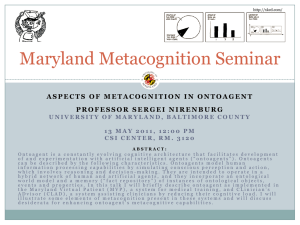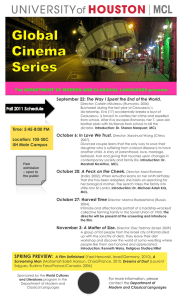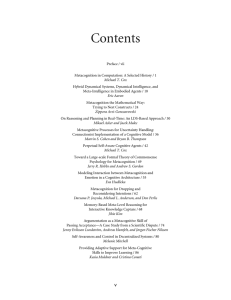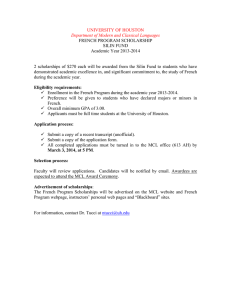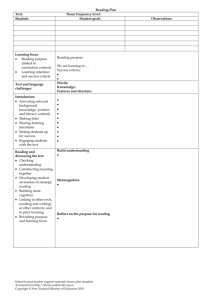Maryland Metacognition Seminar METACOGNITION — A BIASED OVERVIEW
advertisement
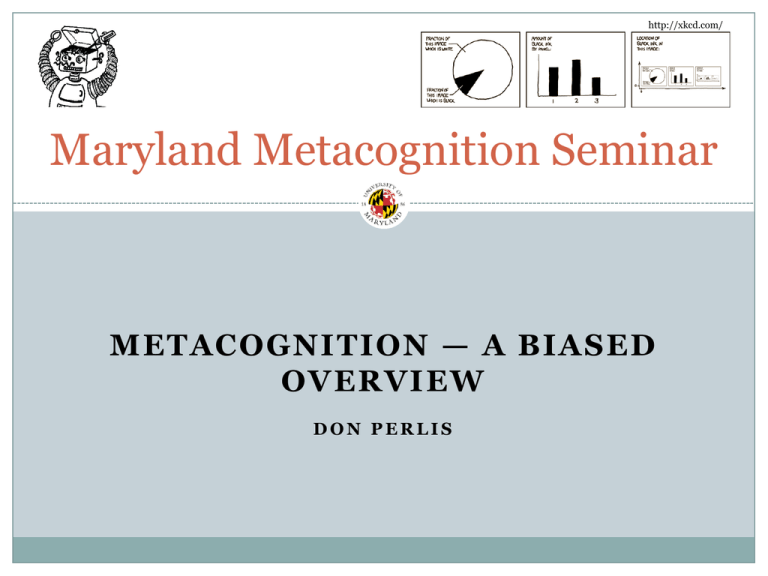
http://xkcd.com/ Maryland Metacognition Seminar METACOGNITION — A BIASED OVERVIEW DON PERLIS Acknowledgements Collaboration with NRL (Perzanowski, Blisard) Large team (Anderson, Cox, Dinalankara, Fults, Jones, Josyula, Oates, Perlis, Sanders, Schmill, Shahri, Wilson) across four campuses (UMCP, UMBC, Bowie State, Franklin&Marshall) Supported by NSF, ONR, AFOSR, UMIACS Outline Metacognition as cog-sci unifier The nature(s) and importance of metacognition Metacognition in logic, philosophy, psychology, linguistics, neuroscience, and computation. Efforts toward robust flexible self-adjusting autonomous agents A unifier? Metacognition seemingly arises across the board in cognitive science. In this talk I will try to convey that phenomenon, and suggest possible reasons for it. What is metacognition? Meta-cognition: cognition about cognition… or more generally, cognition about the cognizer or even about cognizers in general A quick glance at some themes Aboutness (Brentano) Agreement (Kripke, Putnam, etc) Appearance-Reality Distinction (Flavell) Time (thick or thin) Self-correcting engines (Watt governor) Two styles of metacog Hierarchical: Entity M processes information about entity S Loopy: Entity S processes information about itself Metacog in Logic To be consistent or not to be consistent? (Russell, Tarski) Paradox of self-reference, or safe stratification (but with infinite regress)? The LIAR sentence: The LIAR sentence is false (or: This sentence is false.) Gilmore-Kripke approach: have cake and eat it too [ True(‘A’) <-> A* ] (safe and expressive but unrealistic for agents) Alternative: embrace inconsistencies (as unavoidable and important clues to things amiss and needing attention) and respond to them. Tall order, in a logic. Active logic i: Now(i), P, -P ---------------i+1: -Now(i), Now(i+1), Contra(i,P,-P) Metacog in Philosophy Brentano, Husserl, Kelly, Lloyd, Humphrey, Newton, Perry, Putnam,… Perry’s shopper: what does one learn, when one realizes a description applies to himself? Robot needs to fix its (own) arm The hard problem, explanatory gap, mind/brain, consciousness: strong self-reference? Metacog in Linguistics “Pool” starts with “P” and rhymes with “T”… Quotation has been ignored (but shouldn’t be) Grice: when speaker utters U, what is conveyed? Do we recall words, or meanings? A: What’s that big thing over there? B: Huh? What large object in that direction? Metacog in Psychology Everyday reasoning: making coffee (things go wrong, need to assess and respond) Apportioning study time: more time on the hard parts, or be sure to master the easier parts? (Nelson et al) Metacog in Neuroscience Various papers on brain activity and self-corrective cognition Efferent copy (VOR, etc) Recent work by Saxe on RTPJ and thinking about others’ mental states Metacog in Computation FOL (Weyhrauch et al, 1980-): agency, reflection and time Principles of metareasoning (Russell, Wefald 1989) Meta-AQUA (Cox, Ram 1992) Non-monotonic reasoning: what I don’t know tells me a lot (Doyle, McCarthy, McDermott, Reiter, Moore) Active Logic: time, contradiction, rapid semantic shift. The metacognitive loop (MCL) Toward human-level autonomy Chippy Rational Anomaly-Handling Why it has been so hard How biology does it RAH principles Chippy has a problem Chippy learns over time (say, by reinforcement learning) where it tends to have success at finding food (in trees) Then things change quickly as cold weather sets in (food is now on the ground) Chippy’s standard learning algorithm cannot adapt quickly, and must first unlearn the previous reward policy (a process as slow as learning it in the first place) In all, it takes Chippy more than double the time to learn the new food locations. A much smarter policy would be to jettison the old policy once it has failed repeatedly, instead of tinkering with it incrementally, and just start from scratch. How a wise Chippy could reason I am trying to find food, using a learned strategy It is no longer working, not even close Best to give it up and learn a new strategy Chippy’s recovery RAH Principles Note anomalies Assess them (familiarity, importance, available strategies) Guide a response into place Note-Assess-Guide: the metacognitive loop (MCL) MCL: Anyone for a game of BOLO? Build a “brain”, let it play World of goals, dangers Can study it in advance, then play, or… …learn on the fly, as needed (i.e., as judged by the brain) MCL: From BOLO to Finland Different implementations, but same underlying features, in: navigation, game-playing, reinforcement learning, non-monotonic reasoning, NLP, etc. General-purpose MCL (three ontologies: indications, failures, responses) MCL: On a practical theme Ship-board firefighting Noisy, uncertain, multi-skill, real-time: ideal testbed for MCL with learning as a repair strategy A major safety issue Action, error, communication Conclusions Metacognition is ubiquitous in cognition. It may be what allows an agent to be flexible and robust across widely varying situations. It may require sophisticated kinds of processing that (i) are largely available, if we put the pieces together, and/or (ii) has still-elusive features bearing on questions in logic, language, psychology, philosophy, etc. …and as I note the time, I see that I should stop, including the stopping of this very line of thought. THANKS FOR LISTENING!
